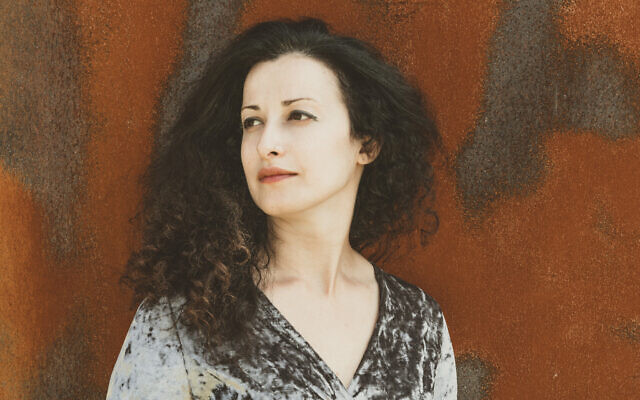With lyrics about a terrible plague with no cure spreading around the world, an unusual song just released on YouTube may sound like an ode to the current COVID-19 pandemic. But this song was written a century ago — in Yiddish.
The ballad titled, “Mentshn-Fresser” (People Devourer) was written by Solomon Small (Smulevitz) in 1916. It was inspired by widespread tuberculosis and polio outbreaks during World War I that wiped out huge numbers of people, including swaths of Jews.
This latest rendition of “Mentshn-Fresser” is performed by Sveta Kundish and Daniel Kahn, along with other members of the Yiddish-speaking community in Berlin. Unable to perform the song live, the musicians decided to produce a video and share it on social media. It has racked up over ten thousand views in a handful of days.
“I was struck by how relevant the song is to what we are going through right now,” Kundish told The Times of Israel.
Composer Small was born in Minsk, Belarus, and immigrated to the US in 1889. He became a prolific and talented early Yiddish composer, especially of popular songs for theaters and variety shows, who not only wrote, composed and sang his own songs, but also created melodies and lyrics for others to perform. The bulk of his songs dealt with subjects such as immigration, Jewish family life, labor conditions, Jewish history and biblical stories — and pandemics.
Also an immigrant, the US-born Kahn, 41, moved to Berlin 15 years ago and works as a musician, songwriter and theater artist in a variety of languages, including Yiddish, German and English.
He is good friends with Kundish, 37, who arrived in Berlin in 2012 to attend cantorial school at the Abraham Geiger College in Potsdam. Kundish, who was born in Ukraine and immigrated to Israel at age 13, currently serves part-time as the first female cantor for the Jewish communities of Lower Saxony. Otherwise, she usually has a busy schedule performing Yiddish songs and Jewish liturgical music in concert.
Although Kundish and Kahn are both part of what Kahn referred to as “a tight-knit global community of Yiddish culture workers in Berlin,” the two had never collaborated on a music video before.

Sveta Kundish (Maria Rodigina)
The musicians decided to embark on this project after Kundish learned of “Mentshn-Fresser” during an online lecture by Kolya Borodulin offered by the Arbeter Ring (Workers Circle) in New York not long after the coronavirus pandemic began. Borodulin shared the text and music for the song, referring to a post on it by Jane Peppler on her “Yiddish Penny Songs” blog.
The duo cut out some parts of the original song, and rearranged some of the verses to make them more relatable to what the world is going through now.

Daniel Kahn (Oleg Farynyuk)
“Basically, we wanted to make it sharper in terms of its relevance,” Kahn explained.
After remotely collaborating on the recording of the song, Kahn and Kundish met up with three musician friends and a videographer at an abandoned, dilapidated estate that Kahn discovered while driving on the outskirts of Berlin with his wife and six-month-old baby. They took social distancing precautions.
“We had originally thought about filming in a cemetery, but we were concerned that we might need to get permits for that. Instead, we found this old estate, and the former owner (who sold it to a developer but still lives there) gave us permission to film there,” Kahn said.
In the lyrics of his song, Small rages at the ravages of tuberculosis and polio, as well as the industrial exploitation of the working class, and the cynical death machine created by rulers pitting their countries against one another in war.
Despite the song’s theatricality, waltz rhythm and juicy rhymes, there is no ignoring its heartbreaking text.
You can’t really ignore that the song is quite a downer
“There’s a certain degree of playfulness in the way we perform the song, but we did it without being disrespectful in any way. And you can’t really ignore that the song is quite a downer,” Kahn asserted.
The repeating chorus is a perfect example:
Microbes, bacilli, what do you want?
Whose will do you serve?
You devour your victims without mercy
You take aim at blossoming life
You bathe in our tears
You suck the marrow from our bones
You poison our innards, you crawling worms
Microbes, bacilli, what do you want?

Susannah Heschel (Dartmouth College)
For Dr. Susannah Heschel, a professor of Jewish studies at Dartmouth College, the scenes described in “Mentshn-Fresser” hit extremely close to home. Her father, the late Rabbi Abraham Joshua Heschel, one of the leading Jewish theologians of the 20th century, lost his father to tuberculosis in Warsaw during World War I. A.J. Heschel was only nine years old when his father, the Hasidic rabbi Moshe Mordechai Heschel, died.
At the time of the elder Heschel’s death, hundreds of thousands of Jews who were forced out of their Eastern European shtetls during the war sought refuge in Warsaw. As a result, there was widespread hunger and disease in Jewish areas of the city, and social services and medical care could not keep up.
“My father spoke a lot about his father, and what had happened to him was very vivid as I was growing up. Because of this, I remember being scared that my dad would die when I was nine,” Susannah Heschel told The Times of Israel.
Although she feels fortunate to be among the Americans who can mainly stay at home and avoid exposing themselves too much to the coronavirus, Heschel said she can’t shake the fear ingrained in her by knowing about her grandfather’s fate.
“When this pandemic began, I thought it would be so horribly ironic if I died in this one after my grandfather died in the one in Warsaw,” she said.

Sveta Kundish, Daniel Kahn and band in ‘Mentshn-Fresser’ (Yeva Lapsker)
Kahn and Kundish are pleased that Heschel and others have shared their video on social media. Although they would much rather be performing live, they are grateful to be able to connect with audiences virtually — and for the financial support that the German government has provided them to help get through this challenging period.
Kundish, who is pregnant, has been glad to have some down time in her final trimester.
As is expressed in one of the lines of “Mentshn-Fresser,” despite all the sadness caused by the death of loved ones, we can perhaps be somewhat comforted “that fresh new lives are supplied to take their place.”
"poison" - Google News
June 29, 2020 at 01:56AM
https://ift.tt/2Zhqyl1
‘You poison our innards’: Revamped 1916 Yiddish pandemic song is new YouTube hit - The Times of Israel
"poison" - Google News
https://ift.tt/2W5dbUB
https://ift.tt/3ceUkwc
Bagikan Berita Ini

















0 Response to "‘You poison our innards’: Revamped 1916 Yiddish pandemic song is new YouTube hit - The Times of Israel"
Post a Comment